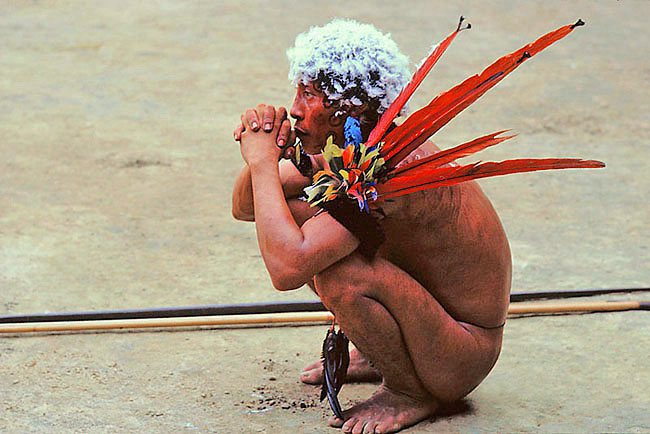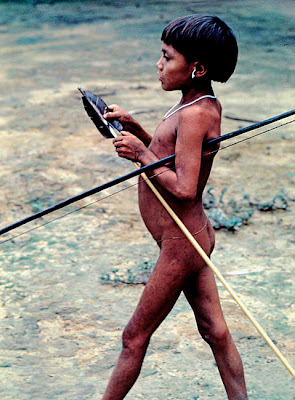Because the geological
expedition I had to photograph was being delayed, I traveled to Tendaho, a
dusty town at the southern end of the Danakil Depression in the Aussa Danakil
sultanate. Here were the fiercest Danakil, and their scrutinizing eyes made me
feel virtually naked. It was evident that I must have looked like some freakish
blunder of nature.
In those days a Danakil man wanting to
marry still had to kill a man, emasculate him, and offer his trophy to the
woman he wanted. It proved his virility, which in this infernal country was
indispensable to the survival of a family.
An
Ethiopian official warned me not to leave the village without a letter from the
sultan. Unfortunately he was absent. After searching for a possible
interpreter, I had to settle on a 53-year-old Moslem named Mahmud, who spoke
Danakil and Italian. He did not speak English, but understood some. I did not
speak Italian, but understood some. Mahmud went to ask a balabat, or local chieftain, for his protection.
The next morning there would be an
important market in Aisayita, a small town 35 miles (56 kilometers) to the east,
which would attract many Danakil. To get there on foot in time we left that
very night. The balabat lent us two men to guide us and two two camels to carry
our luggage and water.
Towards 4:00 a.m., five armed Danakil
warriors emerged from the darkness to have a close look at me. One of them
tested my biceps, commented on the vigor of my handshake, deluged Mahmud with
questions about me, the ferengi, or
foreigner , and asked us for cigarettes (though a non-smoker, I always carried
some). While those men nailed us there for a while, our two guides moved on
ahead. Then, with that same man holding my hand, we walked together for a while,
though too slowly to catch up with our guides.
Not long after the five Danakil had
finally drifted away, the dark nightmarish desert produced four new
warriors--younger and evil-looking. They
too assailed Mahmud with questions as we kept walking. Over the next 15 minutes
or so their voices behind me got louder and louder, with the word ferengi
bouncing back and forth. And there was disturbing tussle. Pretending to be unaware of what was
happening in my back, I did not allow myself to look around as I kept walking.
Doing so would have forced me to interfere, stopping the march, and putting us
at even greater risk.
But at some point
Mahmud could no long contain his tormentors.
“Make trouble! Make trouble!” Mahmud cried,
his voice shaking with rage and anguish. “I know, Mahmud” I replied. “But
please let’s keep calm.” Still, I started wondering whether my manhood would
end up hanging in a woman’s tent or from a horse’s bridle, as was the custom.
When Mahmud was pushed against me, just as
our two guides had finally become visible and Mahmud was crying for their help,
I turned around to see that one of the men had unsheathed his large curved
knife. Fortunately, our two guides, animated by a devilish fury, came rushing
back, shouting what must have been insults and perhaps the name of the balabat,
our Tendaho protector. Sheepishly, though chuckling to keep face, our
tormentors walked away.
Mahmud’s face was ashen (I could not see
my own), and for an hour or so I could not get anything out of him. Finally, he
told me that the Danakil had grabbed our cigarettes and a box of biscuits he
was carrying for breakfast. When a man asked him what I carried in my camera
bag, Mahmud warned him that my people would seek revenge on him if they harmed
me in any way. But he had found this amusing.
“This man carries no gun and has no armed escort,” he said. “He’s a nobody, and no one will
come looking for him after we kill him—and you.” When he was going to pull my
camera bag from my shoulder, Mahmud hit his hand with the stick that Ethiopians
always carry around. At that, the man had pushed him and pulled his knife.
At Aisayita, which was crowded with
heavily armed Danakil men, I photographed many. Ignoring their suspicious eyes,
and working quickly from one man to the next, I pretended it was the most
normal thing in the world and got away with it. Later I would spend some time
documenting the daily life of some Danakil encampments.
When I returned to Makale once more, I
found the geologists installed at the hotel. I thought I was safe now. But my
recklessness would see to it that my adventures were only just beginning. I’ll tell you about them
in other posts.
View photos below, following French translation.
****************************
Comme l’expédition
géologique que je devais photographier n’arrivait pas, je voyageai à Tendaho,
un gros village poussiéreux au sud de la dépression Danakil dans le sultanat
des Danakil Aussa. Beaucoup de ces Danakil pratiquaient encore la fâcheuse
coutume qui exigeait de l’homme en quête d’épouse de tuer d’abord un autre
homme, de l’émasculer et d’offrir à sa bien-aimée le trophée qui prouverait sa
virilité, indispensable pour assurer la survie d’une famille dans ce pays
infernal.
A Tendaho les hommes Danakil, armés de
vieux fusils et d’énormes couteaux courbes, m’entouraient de toutes parts.
M’observant avec des yeux peu amicaux et hésitant à me céder le pas sur les
allées de sable, ils me faisaient sentir
aussi nu qu’à la naissance. Il était évident que je devais être à leurs
yeux une sérieuse anomalie de la nature—blond, yeux bleus, rouge de la brulure
du soleil… (Un an plus tard, chez les Dayak de la jungle de Bornéo, mes yeux
bleus me donneraient une certaine aura. Mais pas ici).
Un fonctionnaire éthiopien m’avertit que
je mettrais ma vie en danger si j’abandonnais le village sans une lettre de
recommendation du sultan. Mais le sultan était absent. Le fonctionnaire me
présenta un Musulman de 53 ans qui parlait le Danakil et l’Italien. Il ne
parlait pas l’Anglais, mais le comprenait un peu. Je parlais l’Anglais et
comprenais un peu l’Italien. En fait d’interprète, je ne trouverais pas mieux à
Tendaho et l’acceptai.
Mahmud me conduisit chez un balabat, un chef local. Le balabat me déclara sous
sa protection et me trouva deux hommes Danakil pour nous guider dans le désert
et deux chameaux pour transporter nos bagages et notre eau.
Nous partîmes à pied la nuit même--pour
éviter la chaleur du jour, mais aussi pour arriver à Asayita, 56 kilomètres à
l’est de Tendaho, le matin suivant. Un grand marché nous y attendait, visité
par de nombreux Danakil.
Vers quatre heures du matin, cinq
guerriers Danakil émergèrent de la nuit. Commentant bruyamment notre rencontre,
ils assommèrent Mahmud de questions à mon sujet et demandèrent des cigarettes
(quoique non-fumeur j’en avais toujours avec moi). L’un des hommes tata mes
biceps et se déclara satisfait de la vigueur de ma main, qu’il ne lâcha
pas. Finalement, nous ayant fait perdre
beaucoup de temps sur place tandis que nos deux guides Danakil continuaient
leur chemin, bien en avant dans la nuit opaque, nous reprîmes la marche tous
ensemble, moi main dans la main du bonhomme, quoique trop lentement pour rattraper nos guides
Au bout de 20 minutes nos cinq Danakil
nous quittèrent. Mais bientôt en apparurent quatre autres, plus jeunes et l’air beaucoup plus sauvage et agressif. Il
devint tout de suite évident que les choses n’iraient plus aussi facilement. Mais
cette fois je ne m’arrêtai pas, ni ralentis la marche. Derrière moi les
questions des Danakil, ou le mot ferengi (étranger) rebondissait constamment,
sonnait avec une violence croissante. Je me rendais compte qu’on se bousculait
dans mon dos, mais prétendais ne pas le savoir. J’espérais donner l’impression
d’être trop important pour avoir á me préoccuper de ma sécurité. Mais espérant
rejoindre nos guides, je m’efforçais d’allonger le pas sans y attirer
l’attention. Avec eux nous serions quatre contre quatre, quoique non armés
nous-mêmes. Par contre, m’arrêter de marcher pour me mêler à la dispute nous
ferait perdre encore davantage de terrain sur nos guides. Finalement, Mahmud n’en
put plus.
« Make trouble ! Make
trouble ! » cria-t-il dans son Anglais rudimentaire. « Je
sais, » lui répondis-je sans me retourner ni ralentir le pas. « Mais
garde le calme si tu peux.» Cependant je commençais à me demander si ma
virilité terminerait bientôt accrochée dans la tente d’une femme ou à
l’encolure d’un cheval, ou ces articles terminaient généralement.
Quand un Danakil poussa Mahmud violemment contre
moi, je n’eus d’autre option que de me
retourner. Un Danakil avait dégainé son énorme couteau, large comme ma main.
Cette fois, d’une voix angoissée, Mahmud
appela nos guides. Heureusement, et quoiqu’invisibles dans l’obscurité, ils
n’étaient plus loin. Abandonnant leurs chameaux ils vinrent á grands cris nous
arracher des mains de ces sauvages. Ce qu’ils crièrent à nos tourmenteurs leur
quitta immédiatement toute arrogance, et penauds ils retournèrent à la nuit.
Le
visage du pauvre Mahmud était de cendre (je ne pourrais dire de quelle couleur
était le mien, moi qui n’avais pas vu le danger d’aussi près que lui). Durant
une heure il ne put ouvrir la bouche. Finalement il parla.
D’abord les Danakil avaient arraché de ses
mains nos cigarettes et les biscuits que nous nous réservions pour la faim.
Quand plus tard l’un d’eux allait s’emparer aussi de la sacoche photographique
qui pendait de mon épaule Mahmud le frappa de son bâton, ce qui les mit tous en
colère. Mahmud leur prédit des représailles féroces de la part de mes gens
s’ils me faisaient du mal. Mais ses paroles les avaient amusés. « Un homme
qui voyage sans escorte et sans armes ne peut être qu’un pauvre diable. »
dirent-ils. « Nous allons tuer cet
homme, et toi avec lui, et personne ne se donnera la peine de vous
chercher. »
Je passai la journée suivante au marché à
photographier les Danakil, tous fortement armés. Ignorant leurs regards méfiants,
j’agis comme si c’était la chose la plus normale du monde, mais passant d’un
homme a l’autre très rapidement. Plus tard je documenterais la vie quotidienne
de quelques campements. De retour à Makale, je trouvai les géologues installés
à l’hôtel.
Je croyais mes aventures terminées, mais j’étais
bien trop insouciant m’en livrer si tôt. En fait elles n’avaient que commence
Je les raconterai prochainement.





















































